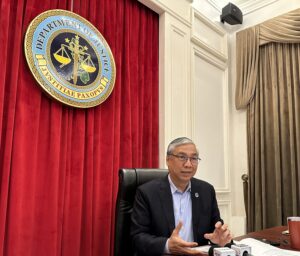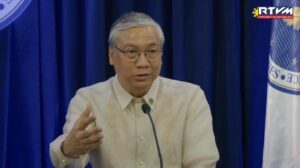The labyrinthine investigation into widespread corruption within the Department of Public Works and Highways (DPWH) has reached a critical juncture, with several former high-ranking engineers and a key contractor now providing what is described as a comprehensive, “telling-all” testimony to the Department of Justice (DOJ). This development marks a potential turning point in one of the country’s most significant recent anti-graft campaigns, yielding evidence now considered sufficient to implicate powerful figures, including incumbent and former senators and members of the House of Representatives.
The breakthrough signals a dramatic escalation from mere allegations to actionable legal testimony, threatening to expose a deeply entrenched system of kickbacks and misappropriated infrastructure funds that has allegedly plagued the nation’s public works sector for years.

The Confluence of Incriminating Testimony
The crucial progress was confirmed by Justice Undersecretary Jesse Andres, who underscored the newfound cooperation of the key individuals. According to Andres, the quality and depth of the witnesses’ accounts have evolved rapidly from fragmented narratives to a complete, cohesive disclosure.
“Previously, in the first interview, they did a few anecdotes, narratives. The second interview they gave a little more, but now I’m very happy to say that they are telling everything,” Andres stated, emphasizing the transformation of the testimonies into a robust body of evidence.
The named individuals who are now providing this incriminating testimony include:
Engineers: Brice Hernandez, Henry Alcantara, Jaypee Mendoza, and RJ Domasig.
Former High Official: Former DPWH Undersecretary Roberto Bernardo.
Contractor: Sally Santos.
The sheer seniority and breadth of involvement of these whistleblowers—spanning both the government agency (DPWH) and the private sector (contracting)—lends substantial credibility and detail to the alleged conspiracy.
High-Stakes Political Implications
The information gathered from this wave of cooperation is not limited to mid-level bureaucrats. Andres affirmed that the DOJ currently possesses adequate evidence to directly implicate a “handful” of high-profile elected officials. This revelation points towards a sophisticated mechanism of corruption where public funds, earmarked for vital infrastructure projects, were allegedly “downloaded” and converted into “kickbacks” involving politicians at the highest levels of government.
The Justice Undersecretary explicitly warned of the extensive reach of the investigation: “For the next batch, there will be proponents or politicians involved in downloading and who availed of the kickback so you can expect a congressman, past or present to be involved in the next batch of cases, senators, whether past or present… and other proponents who may be involved.”
This is not the first time political figures have been linked to the scandal. Previous sworn testimonies provided by Alcantara, Hernandez, and Mendoza had already prompted the National Bureau of Investigation (NBI) to recommend the prosecution of several lawmakers, notably including former Senate President Francis “Chiz” Escudero and former lawmaker Zaldy Co. These individuals, along with all others allegedly implicated, have consistently and vehemently denied the allegations brought against them.
The DOJ is rapidly translating this testimony into legal action. Andres announced that a “next batch of six cases” is already prepared for “case build up” and will proceed to preliminary investigation by the middle or late of the following week. This rapid movement signals the government’s commitment to capitalizing on the momentum provided by the whistleblowers’ full cooperation.
A Bilateral Approach: Specific Immunity and Massive Restitution
In handling this sensitive testimony, the DOJ is employing a carefully calibrated legal strategy focused on two critical aspects: conditional immunity and financial restitution.
Firstly, Undersecretary Andres stressed that the cooperating witnesses have been unequivocally informed that they will not be granted blanket immunity from prosecution. This decision acknowledges that the whistleblowers themselves participated in the criminal activities they are now exposing. Instead, the DOJ will offer specific immunity for each individual case where their testimony is deemed essential and used to secure a conviction.
“We are not giving any blanket immunity to any of the whistleblowers. And they have agreed to that and they understand the situation. But we will give specific immunity for each particular case where their testimony will be used,” Andres clarified. This approach holds the cooperators accountable for their actions while incentivizing them to provide the most truthful and detailed information possible against the more powerful figures.
Secondly, a major component of the cooperation involves mandated restitution. The government is not merely seeking convictions; it is aiming to recover the stolen public funds. The whistleblowers are now actively collaborating on this financial aspect, with the potential to return a staggering amount of money to the nation’s coffers.
The estimate for the potential asset recovery stands at up to P1 billion (One Billion Philippine Pesos). This monumental sum would be returned in various forms, including cash, real property, vehicles, and even jewelry. Andres underlined the necessity of this recovery effort, noting that these seized assets could subsequently be auctioned off, maximizing the return for the public good. This focus on asset recovery underscores the financial gravity and scale of the corruption involved in the infrastructure projects.
The Fragility of Cooperation: The Discaya Defection

Despite the significant breakthroughs, the investigation has faced challenges in maintaining the cooperation of all potential witnesses, highlighting the extreme pressure and sensitivity surrounding the probe.
Andres confirmed a notable setback: contractors Curlee and Sarah Discaya are no longer collaborating with the DOJ. The Discaya couple had previously withdrawn their cooperation from the Independent Commission for Infrastructure (ICI). This withdrawal reportedly followed a media interview given by ICI Commissioner Rogelio Singson, where he stated that no individual had yet qualified for the coveted status of a state witness.
This defection illustrates the fragile nature of the Witness Protection Program (WPP) and the high stakes involved. Potential state witnesses often seek assurances of full immunity, and perceived ambiguity or uncertainty regarding their status can lead to withdrawal.
The Justice Undersecretary acknowledged the situation, stating, “As far as the Discayas are concerned, they have stopped coordinating with us… So I do not know where they want to seek us, but the office is always there open if anybody, any possible whistleblower would come forward, to seek the help of the Witness Protection Program.”
The DOJ’s public reaffirmation of its commitment to the WPP serves as an open invitation, attempting to mitigate the chilling effect of the Discayas’ departure and encourage other individuals with knowledge of the alleged conspiracy to come forward.
In sum, the investigation has moved past its initial stages of fact-finding into a phase of direct legal action and asset recovery. The unprecedented disclosures from key DPWH insiders, coupled with the DOJ’s strategic handling of immunity and restitution, positions the government to launch a serious legal challenge against high-ranking political figures, marking a potentially historic moment for accountability and anti-corruption efforts in the Philippines.





